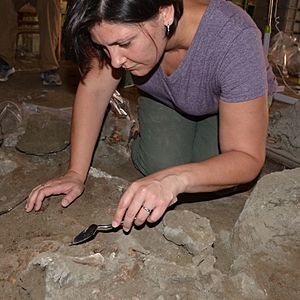Kristina Killgrove facts for kids
Quick facts for kids
Kristina Killgrove
|
|
|---|---|

Kristina Killgrove excavating at Oplontis, Italy.
|
|
| Born | March 10, 1977 |
| Nationality | American |
| Alma mater | University of North Carolina at Chapel Hill |
| Children | 2 |
| Awards | Society for American Anthropology Excellence in Public Archaeology Award; American Anthropological Association New Directions Award for Excellence in Public Anthropology |
| Scientific career | |
| Fields | Bioarchaeology, Roman archaeology, science communication |
| Institutions | University of West Florida, Vanderbilt University, SUNY Cortland, UNC Chapel Hill, Ronin Institute |
| Thesis | Mobility and Migration in Imperial Rome |
| Academic advisors | Nicola Terrenato |
Kristina Killgrove (born March 10, 1977) is an American bioarchaeologist, a person who studies ancient human skeletons. She is also a science communicator and author. Her work mainly focuses on anthropology (the study of human societies and cultures) and archaeology (the study of human history through digging up old sites). She does research on ancient Roman skeletons.
Kristina Killgrove writes for popular science websites like Live Science and used to write for Mental Floss and Forbes. From 2012 to 2018, she was a professor of anthropology at the University of West Florida. She has also been a research scholar at the Ronin Institute since 2011 and is currently connected with the University of North Carolina at Chapel Hill.
Contents
Early Life and Education
Kristina Killgrove grew up in Charlottesville, Virginia. Her father worked as an engineer for a government agency, and her mother was a nurse. She has one brother.
She went to Albemarle High School. After high school, she studied at the University of Virginia. There, she earned a bachelor's degree in two subjects: classical archaeology and Latin.
Killgrove continued her studies at East Carolina University, where she earned a master's degree in anthropology. Later, she attended the University of North Carolina at Chapel Hill. She earned another master's degree in classical archaeology and then a PhD in anthropology.
She has taught college classes at several universities. These include the University of West Florida, Vanderbilt University, UNC Chapel Hill, SUNY Cortland, and Durham Technical Community College. Kristina Killgrove is married to Patrick Reynolds, and they have two children.
Discovering Ancient Lives: Research Projects
Kristina Killgrove's first big research project was for her PhD. She studied skeletons found in two ancient cemeteries in Imperial-era Rome. This work helped her figure out what people ate long ago, which is called palaeodietary reconstruction. She also used a method called strontium isotope study. This helped her understand how people moved around and migrated within the Italian peninsula.
From 2010 to 2017, Killgrove worked on human skeletons found at the ancient site of Gabii. This project was led by Nicola Terrenato. Since 2017, she has been leading her own team. They are working at the ancient Roman site of Oplontis, which is near Mount Vesuvius.
Sharing Science: SciComm
Kristina Killgrove is very good at "SciComm," which means science communication. This is about sharing scientific ideas with everyone, not just other scientists. She has written a blog called "Powered by Osteons" since 2007.
From 2015 to 2020, she wrote a regular column for Forbes. In her column, she covered interesting news about archaeology and anthropology. She also wrote occasional articles for Mental Floss starting in 2016. In 2022, she began writing for Live Science.
Kristina Killgrove has won two awards for her excellent work in science communication. She has also shared her expert knowledge with many news outlets. These include CNN, the BBC, LiveScience, Gizmodo, Ars Technica, Newsweek, NPR, and Quirks & Quarks.
Awards and Recognition
Kristina Killgrove has received important awards for her work:
- 2017 – Excellence in Public Archaeology from the Society for American Archaeology
- 2016 – New Directions Award for Public Anthropology from the American Anthropological Association
 | John T. Biggers |
 | Thomas Blackshear |
 | Mark Bradford |
 | Beverly Buchanan |

